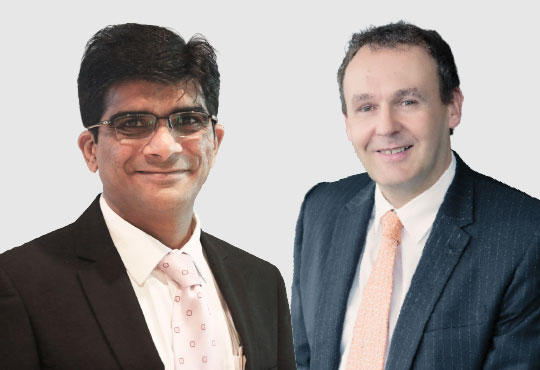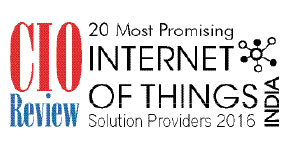 Aimed at transforming India into a global hub, the ‘Make in India’ initiative of the Indian Government has attracted eyeballs from across the world. But the project requires several facets in order to become a successful initiative, and Internet of Things (IoT) is anticipated to act as an accelerator to fast forward the initiative. Moreover, as the Analyst firm Gartner expects as many 26 billion smart devices like connected cars and wearables like smart watches to be connected through IoT by 2020; it’s time for India to take advantage of the IoT wave. So in order to ensure IoT is effective in India, a strong collaboration is required between government and the industry to provide IoT services without compromising privacy and security of customers.
Aimed at transforming India into a global hub, the ‘Make in India’ initiative of the Indian Government has attracted eyeballs from across the world. But the project requires several facets in order to become a successful initiative, and Internet of Things (IoT) is anticipated to act as an accelerator to fast forward the initiative. Moreover, as the Analyst firm Gartner expects as many 26 billion smart devices like connected cars and wearables like smart watches to be connected through IoT by 2020; it’s time for India to take advantage of the IoT wave. So in order to ensure IoT is effective in India, a strong collaboration is required between government and the industry to provide IoT services without compromising privacy and security of customers. 
ANSYS has always considered India as one of its fastest growing markets globally in terms of performance
For India to be the fastest growing manufacturing environment in the world, simulation is expected to play an important role in bringing the paradigm shift towards, engineering, design, innovation and manufacturing. It is critical for organizations to maintain a competitive edge by discovering new ways to compress product design and manufacturing cycles. “We believe the cornerstone of the ‘Make in India’ campaign is to promote a culture of innovation in Indian manufacturing.” says Rafiq Somani, Country Manager INDIA, ASEAN & ANZ, ANSYS. One of the largest engineering simulation companies in the world, headquartered in Pittsburgh, USA, with Indian headquarters in Pune, Maharashtra; ANSYS has been pioneering the development and application of simulation methods for over 45 years, solving the most challenging engineering problems of clients. Exercising simulation driven product development, the organisation serves more than 40,000 customers across the globe, aiding them to decrease product’s time to revenue, reduce R & D costs, minimize prototypes and generate quicker product approvals.
Empowering IoT Wave via Simulation
“IoT is all about enabling connectivity and embedded intelligence in devices so that the future IoT devices can deliver connected functionality and perform well in diverse environments.” believes Tom Kindermans, VP Asia, ANSYS.
While the concept of IoT is picking pace at various levels, the industrial sectors are seeing an explosion of technological enhancements owing to emergence of the IoT and intelligent devices. Speeding the development of IoT devices, networking infrastructure and cloud computing platforms for about four decades now; ANSYS simulation technologies have been empowering customers to innovate industry-leading products using predictive physics-based simulation software that provides a critical pathway to address the manufacturing challenges at early stage. The enterprise further furnishes simulation solutions that help creating virtual prototypes of complex systems, comprising of mechanical, electronics and embedded software components which incorporate all the physical phenomena existing in the real-world environments. The firm develops and markets engineering simulation software to lower the development costs, reduce the time to market and optimize product performance to address customer’s current and future product requirements.
Embracing the World of Automotives
Autonomous vehicles are becoming a reality these days, but the apprehension on the safety aspect still prevails. Therefore, addressing the safety concerns of the passengers is gaining top priority, making auto manufacturers live with an obligation to produce the most robust systems possible. ANSYS being prominent payer in the IoT space and in particular the automotive industry is working with most of the leading OEMs globally in the automotive space. ANSYS software is designed to be easy and intuitive to use, enabling the democratization of auto engineering, as more diverse employee teams work towards a common goal. Software features such as engineering knowledge management and ANSYS Workbench platform enable automotive teams including OEMs and multi-tier suppliers to collaborate in a powerful manner, sharing workflows and simulation data. Moreover, as the user needs in the automotive industry have become more complex, ANSYS responds by making significant R&D investments that allow engineers to arrive at more accurate results without increasing human resources and other product development costs.
Driving Large-Scale Antenna Simulation
Driven by IoT, antennas are becoming increasingly pervasive across industries and products like, autonomous vehicles, smart metering, drones, bio-sensors and wearables. In the context of IoT, Antenna simulation can be small, like in watch, mid-sized, like antennas in cars and large-scale simulation throughout.ike in war-ships. So the current level of integration requires engineers to mitigate EMI/EMC issues as well as thermal issues. A reliable solution for RF and microwave system
l design engineers in the scenario is ANSYS electromagnetic simulation software that conducts high-fidelity 3-D EM simulations, analyzes geometric-scale variations, performs thermo-mechanical stress analysis and optimizes the antenna design. Besides, the integrated workflow enables clients to rapidly conduct design trade-offs, resulting in improved range, reliability, and data“With the acquisition of Delcross Technologies, a computer aided engineering (CAE) company with software products for the simulation and radar signatures, ANSYS now is the only organisation in the world that provides end-to-end solutions from small, i.e. a microprocessor to very large-scale antenna simulation such as military vehicles.” affirms Tom. The strategic acquisition of Delcross Technologies further strengthens ANSYS leadership in high-frequency electromagnetics. The combination of ANSYS and Delcross provides a powerful solution for next generation wireless system design and an unparalleled IoT portfolio in the industry.
Creasing out Pain Points of Medical Device Companies
As healthcare is evolving across the globe with adoption of disruptive innovation in treatment, patient’s health is also valued more than before, eliminating the option of product failures. Despite several measures taken by the Indian Government to introduce major changes in the regulatory landscape of clinical research, the clinical testing is incapable of addressing every possible situation or condition. Hence medical companies are adopting engineering simulation (in silico testing) to systematically identify and resolve worst-case scenarios, meeting safety standards and product deadlines. Engineering simulation solutions from ANSYS are making medicine participatory, personalized, predictive and preventive via the medical Internet of Things. “When medical device manufacturers collaborate with clinical partners and simulation software providers such as ANSYS, it is possible to progressively add more patient-specific geometries to the database.” affirms Rafiq.
Researchers at ANSYS embrace the vision of Medical Device Innovation Consortium (MDIC) for bringing advances in the medical device regulatory science. Evolving from a product and technology tool provider to an innovator in healthcare simulation looking at physiological models, ANSYS plays an important role in collaborating with MDIC’s CM&S project. The representatives from ANSYS work with the group to enable medical device developers to generate more groundbreaking ideas and bring devices to patients more safely and quickly.
ANSYS and the Asian Market
In Asia, simulation technology adoption is growing varying for each country. “Asia is one of the fastest growing regions for the company. In particular China and India are fast growing markets in overall use of simulation, number of users in the region and thereby ANSYS stands to gain from this development in these markets.” claims Tom. ANSYS Asia contributes significantly to the global revenues of ANSYS, almost an equal percentage of what is contributed from ANSYS North America and ANSYS Europe. So, ANSYS reiterates Asia’s relevance to the organisation and considers the Asian region not only a significant contributor but also a stimulator of the high rate of ANSYS’ growth. The company thus plans on investing heavily in new projects for Asian markets, especially India in the upcoming years.
Achieving Dexterity with Talent Acquisition
Be it the software solution development team, technical support teams or robust sales network that includes channel partners, the performance graph across ANSYS is driven by the best-in-class application experts that ANSYS houses. With a 3,000 member strong team across continents, ANSYS is making a difference in the world of engineering simulation and product development. “People are an important asset and we take pride in employing, training and growing one of the best talents in the industry” adds Tom. The firm makes a significant investment in developing employees by providing continuous training so they grow to their full potential.
Supporting ‘Make in India’ for a ‘Skillful India’
ANSYS has always considered India as one of its fastest growing markets globally in terms of performance. The firm plans to further strengthen its base in India by being a part of several initiatives launched by the Government of India. “The success of ‘Make in India’ will be driven by better designs that translate into efficient manufacturing and developing competitive products leading to greater innovation.” believes Rafiq. ANSYS also sees the ‘Skill India’ initiative by the Indian Government as a significant move. The firm, prides in taking several steps for inculcating skills in the team ANSYS. The firm launched an Authorized Training Program Center (ATC) program to ensure industry ready engineers. In addition to ATC, the organisation works closely with the Society for Automotive Engineers (SAE) to sharpen the skills among future engineers. Moreover, ANSYS also encourages the faculty, along with the interns/ trainees, by supporting the Dronaharya Award for best performing faculty member among the competing teams. “Thus, over all training model adopted by us, continues to generate industry-ready professionals.” concludes Rafiq.
In the Days to Come
With the growing need for simulation among emerging industries in India, ANSYS has been carrying the legacy of developing software to widen the areas of simulation application. The organisation believes that by 2022, every engineer will opt to use simulation for the product development. The simulation giant ANSYS awaits the simulation wave with determination and enthusiasm in India and claims to be prepared to lend its expertise to meet engineering and manufacturing challenges bestowing best in class quality and cost in the upcoming times.
Creasing out Pain Points of Medical Device Companies
As healthcare is evolving across the globe with adoption of disruptive innovation in treatment, patient’s health is also valued more than before, eliminating the option of product failures. Despite several measures taken by the Indian Government to introduce major changes in the regulatory landscape of clinical research, the clinical testing is incapable of addressing every possible situation or condition. Hence medical companies are adopting engineering simulation (in silico testing) to systematically identify and resolve worst-case scenarios, meeting safety standards and product deadlines. Engineering simulation solutions from ANSYS are making medicine participatory, personalized, predictive and preventive via the medical Internet of Things. “When medical device manufacturers collaborate with clinical partners and simulation software providers such as ANSYS, it is possible to progressively add more patient-specific geometries to the database.” affirms Rafiq.
Researchers at ANSYS embrace the vision of Medical Device Innovation Consortium (MDIC) for bringing advances in the medical device regulatory science. Evolving from a product and technology tool provider to an innovator in healthcare simulation looking at physiological models, ANSYS plays an important role in collaborating with MDIC’s CM&S project. The representatives from ANSYS work with the group to enable medical device developers to generate more groundbreaking ideas and bring devices to patients more safely and quickly.
ANSYS and the Asian Market
In Asia, simulation technology adoption is growing varying for each country. “Asia is one of the fastest growing regions for the company. In particular China and India are fast growing markets in overall use of simulation, number of users in the region and thereby ANSYS stands to gain from this development in these markets.” claims Tom. ANSYS Asia contributes significantly to the global revenues of ANSYS, almost an equal percentage of what is contributed from ANSYS North America and ANSYS Europe. So, ANSYS reiterates Asia’s relevance to the organisation and considers the Asian region not only a significant contributor but also a stimulator of the high rate of ANSYS’ growth. The company thus plans on investing heavily in new projects for Asian markets, especially India in the upcoming years.
Achieving Dexterity with Talent Acquisition
Be it the software solution development team, technical support teams or robust sales network that includes channel partners, the performance graph across ANSYS is driven by the best-in-class application experts that ANSYS houses. With a 3,000 member strong team across continents, ANSYS is making a difference in the world of engineering simulation and product development. “People are an important asset and we take pride in employing, training and growing one of the best talents in the industry” adds Tom. The firm makes a significant investment in developing employees by providing continuous training so they grow to their full potential.
Supporting ‘Make in India’ for a ‘Skillful India’
ANSYS has always considered India as one of its fastest growing markets globally in terms of performance. The firm plans to further strengthen its base in India by being a part of several initiatives launched by the Government of India. “The success of ‘Make in India’ will be driven by better designs that translate into efficient manufacturing and developing competitive products leading to greater innovation.” believes Rafiq. ANSYS also sees the ‘Skill India’ initiative by the Indian Government as a significant move. The firm, prides in taking several steps for inculcating skills in the team ANSYS. The firm launched an Authorized Training Program Center (ATC) program to ensure industry ready engineers. In addition to ATC, the organisation works closely with the Society for Automotive Engineers (SAE) to sharpen the skills among future engineers. Moreover, ANSYS also encourages the faculty, along with the interns/ trainees, by supporting the Dronaharya Award for best performing faculty member among the competing teams. “Thus, over all training model adopted by us, continues to generate industry-ready professionals.” concludes Rafiq.
In the Days to Come
With the growing need for simulation among emerging industries in India, ANSYS has been carrying the legacy of developing software to widen the areas of simulation application. The organisation believes that by 2022, every engineer will opt to use simulation for the product development. The simulation giant ANSYS awaits the simulation wave with determination and enthusiasm in India and claims to be prepared to lend its expertise to meet engineering and manufacturing challenges bestowing best in class quality and cost in the upcoming times.




